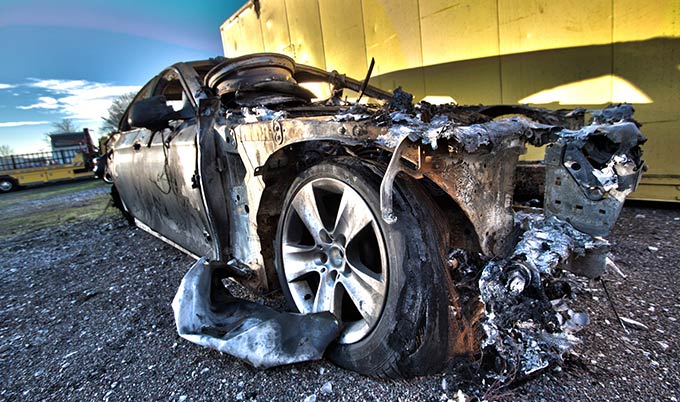
photo: AllState
The only thing worse than a car accident that can be repaired is a car accident where your car is totaled. And it’s also one of the first questions people ask us after they come in for an estimate. After all, nobody plans on having a car accident. Let alone, you rarely get in your car thinking, “this is the last day I’m going to drive this thing.”
When facing the possibility of a total loss, some people might still owe money on their car. Some might even have negative equity, which makes the situation even worse. You have to deal with a number of different variables, from Insurance claims to auto repair shops and possibly even injuries. But when an auto repair shop totals your car or determines it as a “total loss,” it can seem like really bad news. But there is a positive side to it and we will discuss that.
Here’s what you need to know:
Cars are usually considered “totaled” when the repair cost estimate is higher than or within 70% of the ACV (actual cash value) of the car. For easy math, if the car is worth $10,000 and the repair estimate is for $7,000, the insurance company will probably total it even though the repair is less than the cost of a replacement.
This can be a confusing process, especially when you’ve heard stories of automobiles that still function being totaled despite a repair being 75% of the ACV. However, even if the cost of repair is less than the value of the car, it may not make sense to repair the car, depending on the threshold percentage.
But why does my car have to be totaled, you’re probably wondering. Surely, there’s still some value left, right? Let’s break it down even more:
Cars aged 1-3 years
Will it total? As always, the answer depends on how bad the damage is, but it probably will not. The average repair cost of a one-year old vehicle is a little over $3,000 and with a value of over $25,000 less than 7% of these vehicles are considered a total loss.
Cars aged 3-5 years
Will it total? Here’s where mileage and condition start to enter the equation, along with the severity of the damage. Remember the insurance adjuster is going to appraise the car as it was just before the moment of loss. If your car had other damage that was not repaired, excessive wear, or high mileage, the ACV will be lower. This will bring you closer in range to the repair costs. Higher priced luxury vehicles, trucks and SUV’s will probably make the “repair it” list, but lower priced compact cars and some sedans might get totaled even at just 5 years old.
Cars 6 years and older
Will it total? Most likely. A vehicle that is anywhere between 10-15 years old has an average repair cost of $2,000 and a value just barely over $6,000. All of this comes into consideration when determining the threshold of the vehicle. The good news is for cars this old is they are most likely paid off, so you will end up getting a nice sum to put as a down payment on your next vehicle.
Total Loss Threshold
This is where something known as a “total-loss threshold” comes into consideration. It varies from state to state, as there are 22 states that use a total loss formula (TLF) instead of a specific threshold percentage. According to carinsurance.com, a total-loss threshold is, “the point where an insurer must legally declare a car totaled and apply for a salvage title.”
Pennsylvania is one of the 22 states that don’t give an exact threshold percentage but instead use a total loss formula (TLF), where insurers will evaluate the cost of repairs plus the vehicle scrap value. If the number is lower than the ACV of your car, insurance may decide to repair it. However, if the number is equivalent to or higher than the ACV before the accident, then your car will be totaled.
The Silver Lining
If you find out that your car was declared a total, be thankful because you wouldn’t want that car back. Even though the decision is often based on what numbers work best for the insurance company, body shops will often tell you that you don’t want a car back that has had a lot of work done. Shocked to hear that? Even though we make our living repairing drivable vehicles, we also want our customers to be safe.
Today’s cars are extremely sophisticated and complex machines full of multiple high strength steels, computers, sensors, and cameras. They are also built to transfer crash energy away from the occupants and this can cause damage in areas not even included in the accident. Even though we could probably put your car back together, in some cases it just should not be repaired.
The manufacturers tell us how a car should and should not be repaired. If your accident involved areas that can’t be joined or welded or rivet bonded safely, then the car should be totaled. If a body shop is telling you to be glad the car totaled, be thankful you walked away not only from the accident but from the continued aggravation that might arise from owning a car hit that badly.
We at 3D Collision Center know this can be a daunting and confusing time, so that’s why we are here to help. We can answer any questions you may have about your car. If you are concerned that your car should be totaled, feel free to contact us at any of our locations.




